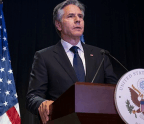Generations after its heyday, isolationism is alive and kicking up controversy

Not so long ago, if you overheard a political conversation about isolationism, you assumed it was about the past.
Popular in the 1920s and 1930s, the idea of America going it alone in the world — politically, economically, militarily — was discredited after the Japanese attack on Pearl Harbor forced the U.S. into World War II in 1941.
Pearl Harbor prompted such leading isolationists as Sen. Arthur Vandenberg, R-Mich., to reverse themselves and become advocates of what he called "international cooperation and collective security for peace." That conversion "took firm form on the afternoon of the Pearl Harbor attack," the senator wrote. "That day ended isolationism for any realist."
That was conventional wisdom for more than 70 years, embraced by Democratic and Republican presidents alike.
But the term and the concept of isolationism are not consigned to the past anymore.
You’re reading a preview, subscribe to read more.
Start your free 30 days





